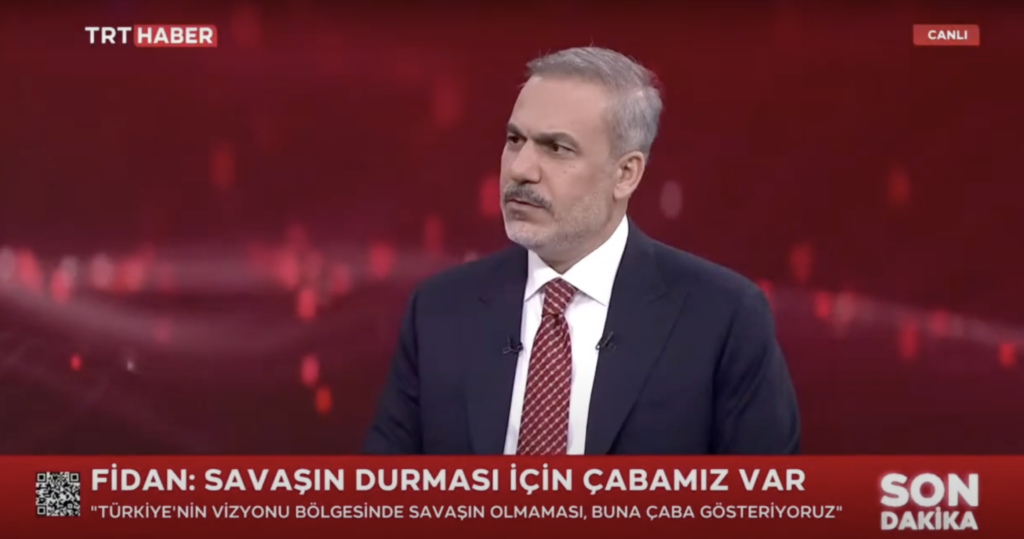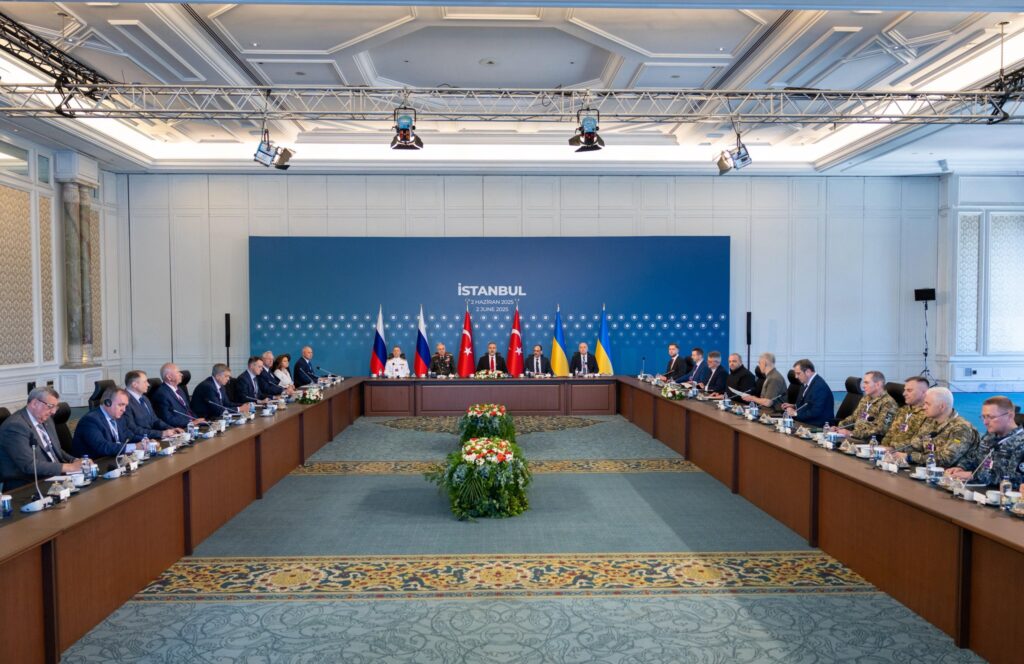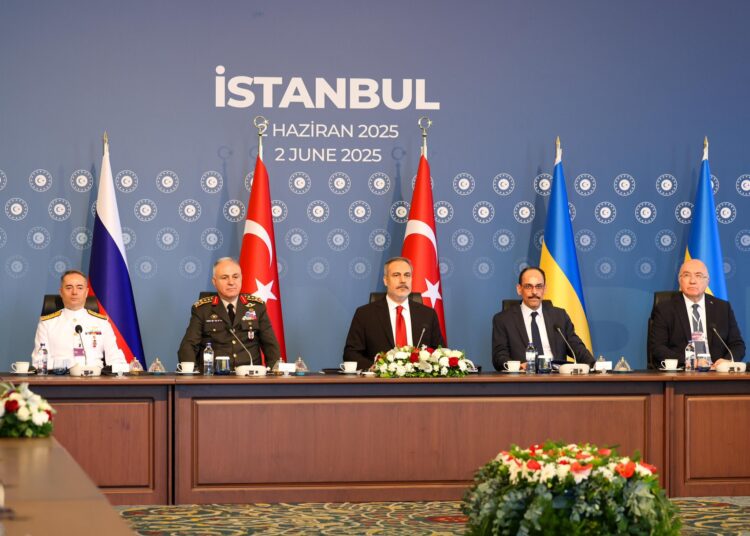Levent Kenez/Stockholm
In an interview with the state-run TRT Haber on Tuesday, Turkish Foreign Minister Hakan Fidan offered a critical assessment of Western involvement in the ongoing Russia-Ukraine war, putting particular emphasis on the roles of the United States and European countries. He argued that certain Western policies have contributed to prolonging the conflict rather than facilitating its resolution.
Since the outbreak of the war in early 2022, Turkey has positioned itself as a mediator, advocating for dialogue and peace. Fidan reiterated Turkey’s call for an end to the conflict, describing the war as a devastating geopolitical crisis with significant human and material costs. “This is no longer a conflict between two countries; it has become a broader geopolitical confrontation,” he said, noting the extensive impact on Europe and the wider world.
While Turkey has engaged in diplomatic initiatives including efforts to facilitate prisoner exchanges and broker agreements such as the 2022 Black Sea grain deal, Fidan sharply criticized some European countries and the United States for policies he views as exacerbating the conflict. He contended that Western support for Ukraine has transformed the war into a broader proxy confrontation.
“We are no longer just facing a war between Russia and Ukraine,” Fidan stated. “There is another war overlapping with it between Russia and other countries that have inserted themselves in this conflict. It is no longer clear which war is triggering the other.”

Responding to a question posed by the interviewer — “How should we interpret the behavior of certain European states that continue to stoke the flames of war even as peace is within reach?” — Fidan pointed to what he sees as destabilizing actions by some European countries. He contrasted these actions with Turkey’s own efforts to facilitate negotiations that included prisoner swaps and humanitarian agreements.
Fidan questioned the rationale behind the continued support for a costly conflict in the 21st century. “Unfortunately, for some actors, strategic positioning and energy politics seem to outweigh the human toll,” he said, indicating that political and economic interests in parts of Europe and the West have taken precedence over peace efforts.
Turning to the United States, Fidan described a noteworthy shift in policy approaches between the Biden administration and the previous Trump administration. Under President Joe Biden, the US had taken a strong stance supporting Ukraine, leading Western diplomatic and military assistance. However, Fidan suggested that the return of former President Donald Trump could signal changes in American policy toward the conflict.
“During President Biden’s term, the US fully supported Ukraine, leading the Western bloc in its stance,” Fidan said. “However, President Trump’s return to power has signaled a possible change in course.” He noted that despite Trump’s indications of a different approach, many of the policies and congressional measures enacted under Biden remain in place, limiting immediate change. “There’s still some time left for those decisions to run their course. Once that ends, we may see a significant shift in US policy under Trump,” Fidan said.
In reviewing the most recent peace negotiations held in Istanbul on May 16 and June 2, Fidan conveyed cautious optimism despite limited progress. The meetings resulted in an agreement to exchange over 1,000 prisoners and included discussions on potential ceasefire terms. Both the Russian and Ukrainian delegations reportedly arrived prepared for talks despite increased violence prior to the June meeting.
“The fact that they still met even after heavy attacks inside Russia shows a certain maturity and commitment to dialogue,” Fidan noted, without elaborating on the details of the discussions.
Turkey has presented itself as a neutral venue and a facilitator for continued diplomacy, mobilizing various institutional resources to support the process. Fidan mentioned ongoing plans to potentially host a summit involving the leaders of Russia, Ukraine and the United States, contingent on future progress in negotiations.
“The war cannot be resolved on the battlefield,” he said. “It will only end when the parties recognize the value of sitting at the same table, not just in Turkey but anywhere they can talk sincerely.”
Fidan’s remarks followed a second round of direct peace talks in Istanbul between Russian and Ukrainian delegations held just over two weeks after an initial meeting. The talks lasted slightly more than an hour and, according to officials, did not produce significant breakthroughs toward ending the conflict.
The negotiations occurred a day after both sides launched significant long-range attacks: Ukraine conducted a major drone strike on Russian airbases on Sunday, and Russia retaliated Thursday with its largest drone attack on Ukrainian targets since the war began.

At the talks the Russian representatives presented a written proposal outlining the Kremlin’s conditions for ending the war. Ukrainian Defense Minister Rustem Umerov, leading the Kyiv delegation, said that Ukrainian officials would require up to a week to analyze the document before responding formally. Ukraine proposed scheduling further discussions between June 20 and June 30, according to Umerov. The contents of the Russian proposal were not disclosed to the public.
As a humanitarian measure, both sides agreed to exchange the bodies of approximately 6,000 fallen soldiers and to establish a joint commission to coordinate the transfer of severely wounded troops.
As a NATO member, Turkey announced shortly after the outbreak of the Russia-Ukraine war that it would not join the European Union and United States sanctions imposed on Russia, citing its energy needs and reliance on tourism revenue. While Turkey has supplied military drones and ammunition to Ukraine, it has simultaneously facilitated commercial activities with Russia in ways that some analysts say undermine the impact of Western sanctions.
Turkey has provided certain trade conveniences to Russian companies, allowing many of them to continue operations through Turkish territory despite international restrictions. Additionally, Turkey has enabled European countries to route goods to Russia via its borders, effectively opening a channel for European exports that bypass some sanctions.
Despite strong warnings from the United States regarding these trade practices, Turkey has only partially halted sales of certain goods to Russia. Overall, trade between Turkey and Russia remains active and robust, highlighting Ankara’s complex position in balancing its geopolitical alliances with economic and strategic interests.












